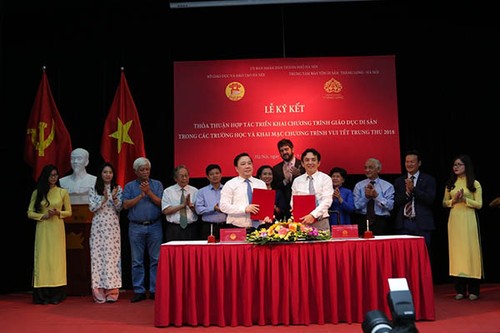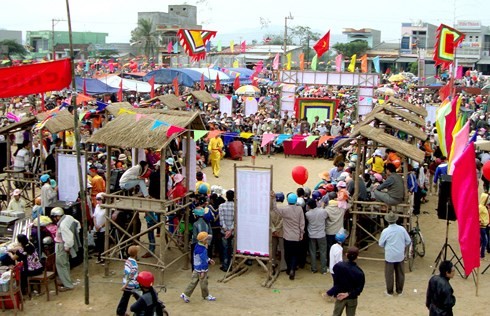A recently inked deal on a heritage education programme in Hanoi’s schools will see the Thang Long Imperial Citadel and the Co Loa relic site added to more curricula. The programme comes in the form of a cooperation agreement between Hanoi’s Education and Training Department and the Thang Long – Hanoi Heritage Conservation Centre and is part of a Government push to preserve historical relics in the city.
 The signing ceremony of a heritage education program will see the Thang Long Imperial Citadel and the Co Loa relic site added to more curricula of Hanoi's schools. The signing ceremony of a heritage education program will see the Thang Long Imperial Citadel and the Co Loa relic site added to more curricula of Hanoi's schools.
|
In the central city of Quang Nam, local authorities have created favorable conditions for various programs and activities to protect and promote the local tradition of Bai Choi singing. The art of Bai Choi in central Vietnam is a diverse art combining music, poetry, acting, painting and literature.
"We’ve created policies to encourage every local citizen to preserve Bai Choi singing through organizing training classes whereby Bai Choi artisans can pass down the art to younger generations. We’ve included performances of Bai Choi singing in various tourism programs for better preservation of the art form through introducing it to a wider public," said Le Van Thanh, Vice President of the Quang Nam provincial People’s Committee.
 A performance of Bai Choi singing A performance of Bai Choi singing
|
Tran Duc Cuong, President of the Vietnam Historical Science Association, elaborated: "In addition to enhancing the responsibility of authorities at all levels in the preservation of cultural heritages, it’s of great importance to increase people’s engagement in such efforts to ensure the sustainable preservation of national heritages."
Addressing the 1st National Conference on Protecting and Promoting Cultural Heritage for Sustainable Development in Hanoi in July, Prime Minister Nguyen Xuan Phuc said: "It’s necessary to help cultural heritages remain vital and ultimately contribute to sustainable development. It’s also of great importance to promote education on preserving cultural heritages to enhance national pride and patriotism."
"The government should strike a balance between tourism development and cultural heritage preservation. In addition, professional staff and advanced technologies should be used to ensure proper restoration of heritage sites," Mr. Phuc added.
Protecting and promoting the value of cultural heritage is not only the responsibility of the Government but the entire society as well. While the State creates legal frameworks and policies, the community plays a key role in maintaining and passing the value of their heritage to younger generations, said Prime Minister Nguyen Xuan Phuc.